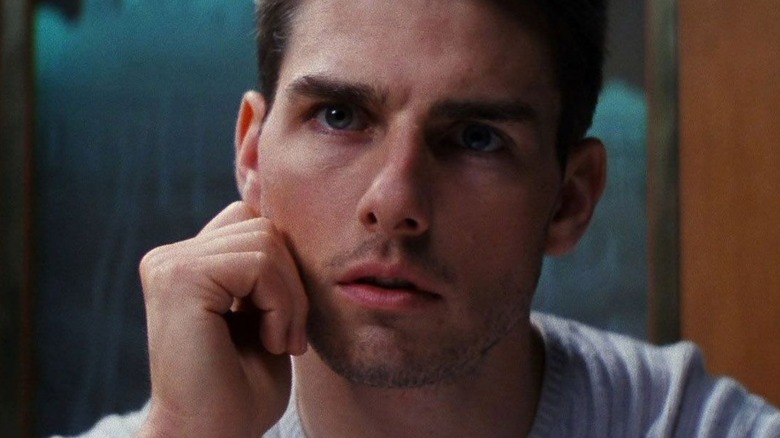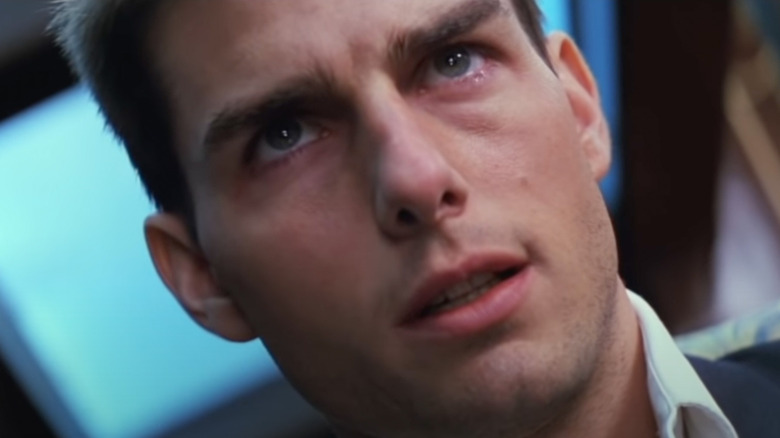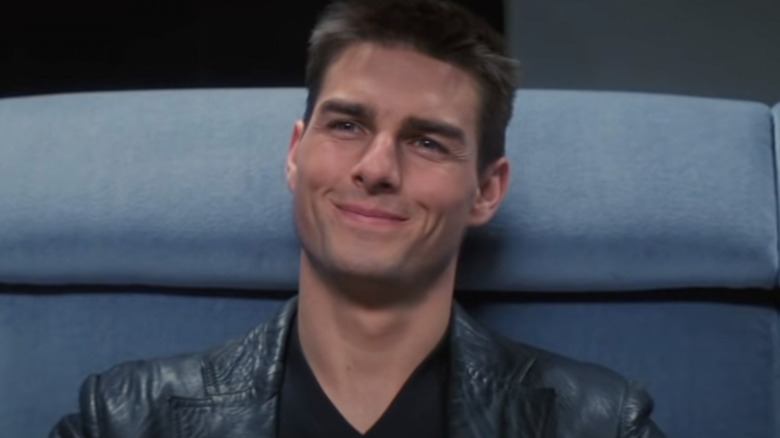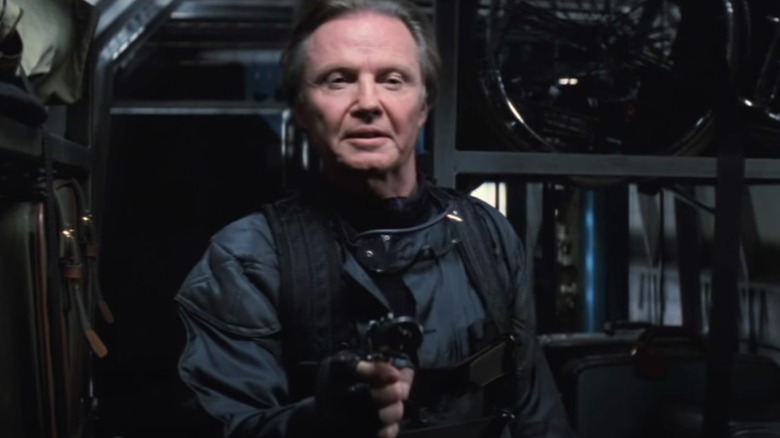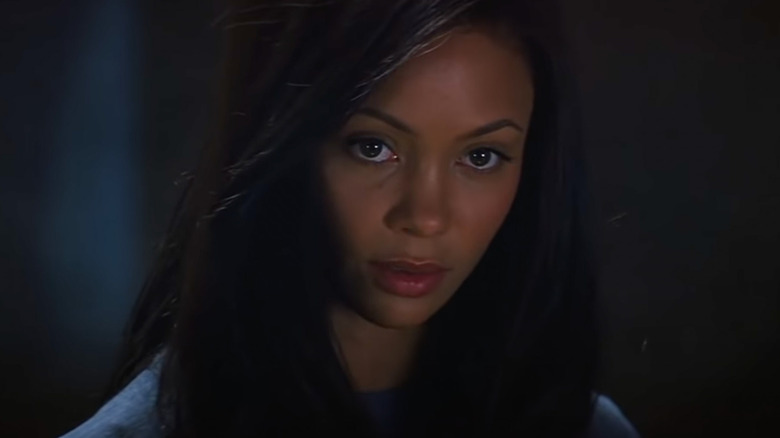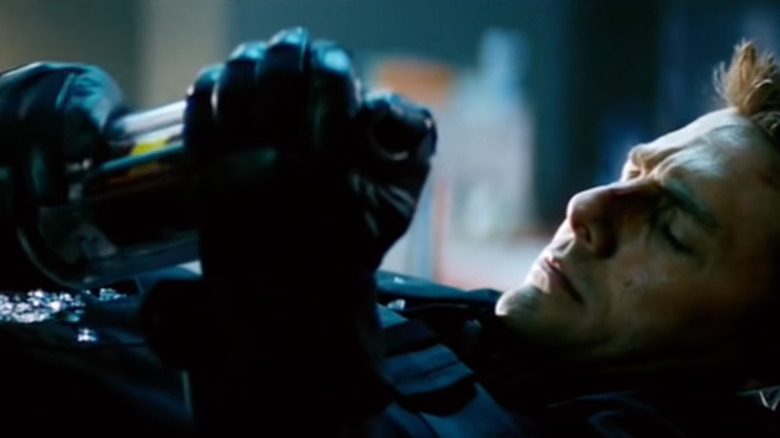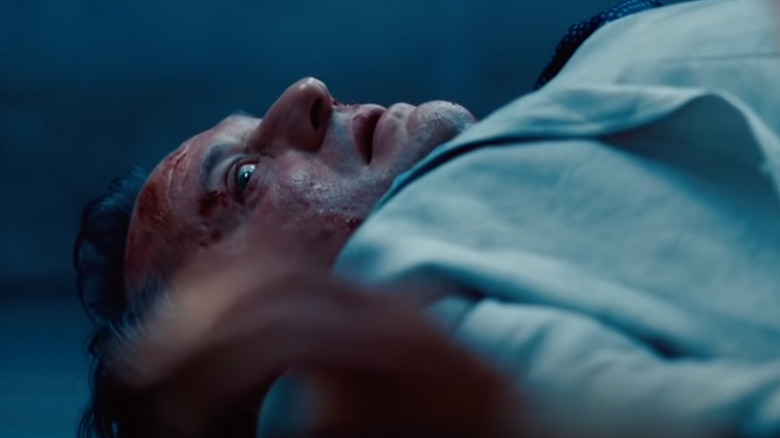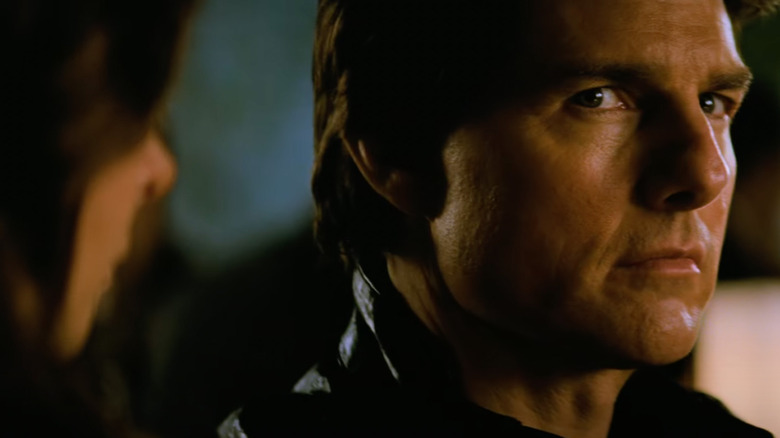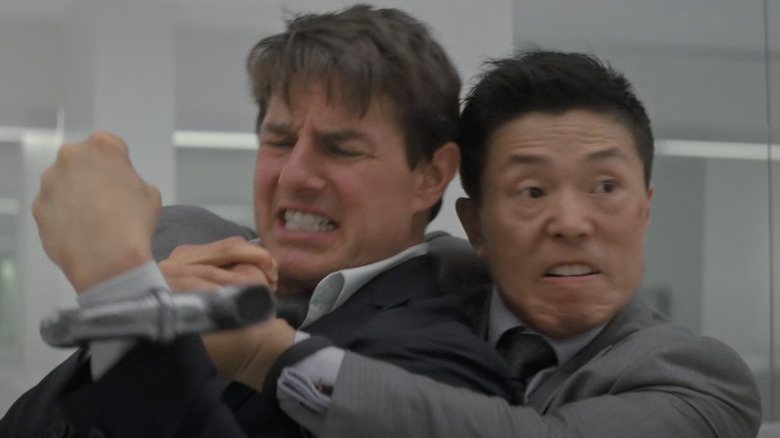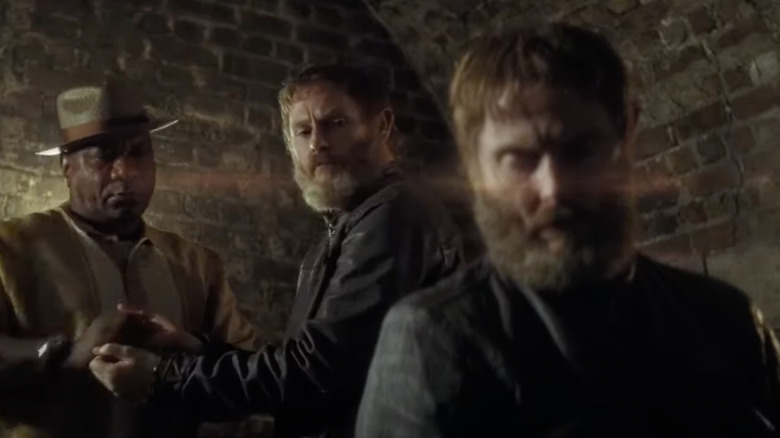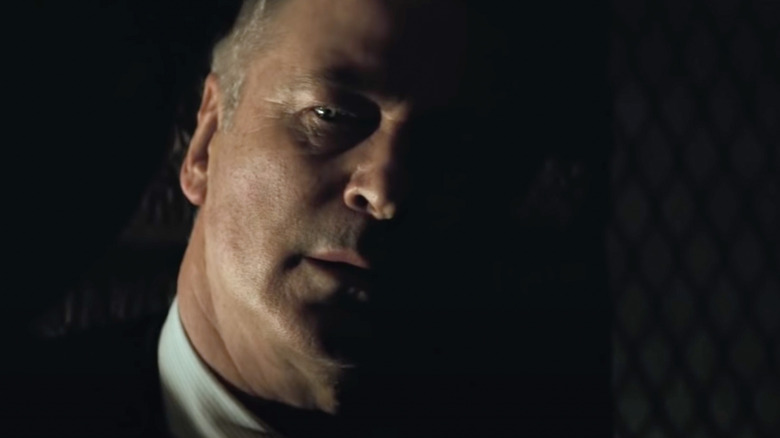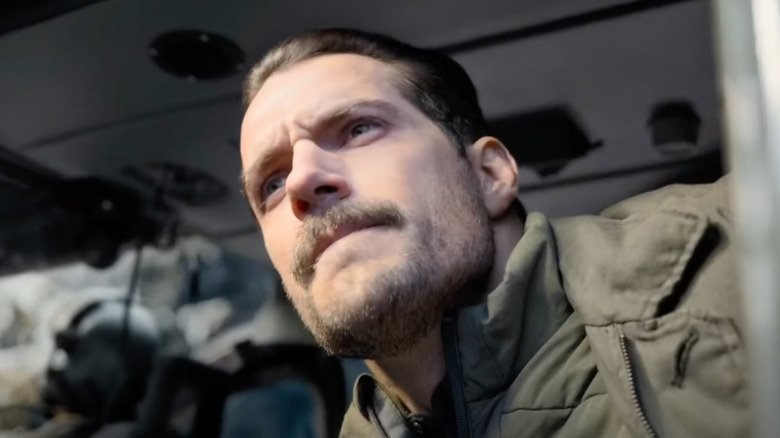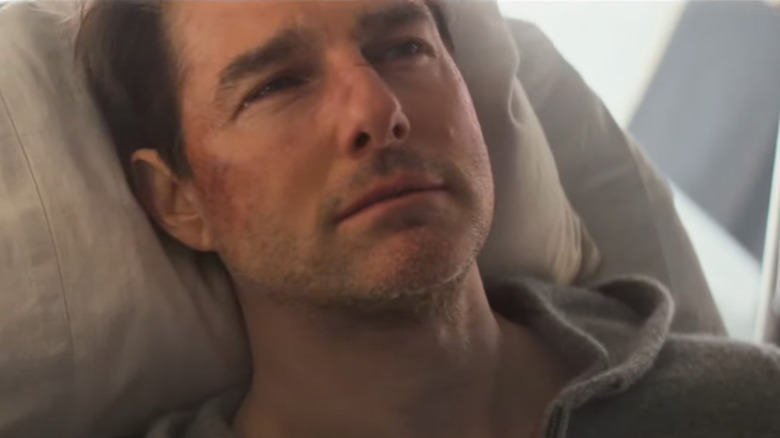The Mission: Impossible Franchise Has Some Major Questions We Still Need Answers To
The "Mission: Impossible" franchise is alive and well in multiplexes despite hitting a few speed bumps over its decades-year journey. It may have taken some time, but the action series finally settled into a groove as a vehicle for Tom Cruise to demonstrate his extraordinary knack for performing death-defying stunts, each more impressive than the last. Audiences flock to each "Impossible" entry, even after six films and counting.
That said, no franchise can span a half-dozen films without raising a few questions. Whether it be plot holes, narrative contrivances, random character actions, or over-the-top action sequences, each chapter of the "Mission: Impossible" saga leaves behind its share of elements certain to leave viewers suspended in confusion. As such, we've decided to piece together a list of "Mission: Impossible" questions in dire need of answers. While we understand some on this list will never receive a satisfying answer, it may still be possible for the long-running series to tie up some of its other lingering plot threads in future sequels.
Your mission, should you choose to accept it, is to read the following list before it self-destructs. Good luck!
Why did Kittridge use the second team twice?
Brian De Palma's "Mission: Impossible" is a stylish affair with fantastic set pieces, tight direction, solid performances, and a plot so baffling you'll likely end up googling "Who the hell is Job?" immediately after the film ends. To make matters worse, tucked within David Koepp and Robert Towne's intricate screenplay are plot points that do not make much sense.
For example, early on, we learn that Ethan Hunt's team of IMF agents — headed by Jim Phelps (Jon Voight) — is shadowed by a second team who sucks at hiding in plain sight. After the botched mission, which leaves many of our heroes dead, Ethan meets with IMF Director Eugene Kittridge (Henry Czerny) at a public restaurant for a debriefing. There, he spots the same second unit masquerading as customers and workers. The gist is that Kittridge believes Ethan killed his teammates in order to steal the CIA NOC list and set up an elaborate ruse consisting of other IMF agents in order to weed him out. The scene in the restaurant is merely another step in a plan designed to apprehend Ethan.
Kittridge should have known that a man of Ethan's incredible skill would recognize a second team, mainly if he spotted them at two different locales on the same night. So, why didn't he bring in a different group to the restaurant scene? Is the IMF understaffed? Underfunded? Or did Kittridge merely underestimate Ethan's abilities?
What's the deal with Ethan's mom and uncle?
One of the more perplexing plot points in the first "Mission: Impossible" movie revolves around Ethan's mother, Margaret, and his Uncle Donald. We never see the pair, save for in a brief news image, but they play a crucial role in the narrative. During the restaurant scene, Kittridge points out that Ethan's recently widowed mother received an influx of cash — $120,000 to be exact — which was enough for her to maintain control of the family's farm in Wisconsin. Later, the IMF director uses this info to falsely accuse Margaret and Donald of drug trafficking to lure Ethan out in the open. At the film's end, Ethan reveals to Luther Stickell (Ving Rhames) that his mother and uncle were eventually released and left wondering how law enforcement mistook them for drug dealers.
Who put the money in Margaret's account? "Mission: Impossible" leaves that plot point unresolved, though we can assume Jim deposited the cash as a step in the plot to frame Ethan. Though, one of Jim's big hang-ups over his job (and the reason he broke bad to begin with) had to do with his meager $62K per year salary. So where did he acquire $120K to spend so freely? Also, if Jim planted the money in Margaret's account, he knew about Ethan's parents' plight, which means he was reasonably close with our hero. Why betray him?
Why did Jim betray Ethan?
So, why did Jim Phelps betray Ethan Hunt? The two were obviously close. Of the team members who die in the first act of "Mission: Impossible," Ethan laments his boss' death the most, which means they likely had a decent relationship spanning several years. The group has a genuine camaraderie when they assemble to discuss the opening mission. They poke fun at Claire's (Emmanuelle Béart) coffee and Jim's great job benefits and even discuss whether or not to set Jack (Emilio Estevez) up with Sarah (Kristin Scott Thomas).
Later, when Ethan bumps into Jim and deduces the truth about his former boss' betrayal, he mentions liking the rentals on Liverpool Street. "Hey, I showed them to you," Jim says with a chuckle, indicating a closeness between the two men.
So, what gives? Why did Jim double-cross his best mate? He mentions that the motives behind his actions revolve around salary, his rocky marriage with Claire, and feeling left behind by the country and government he swore to protect. That still does not answer why he would suddenly betray those closest to him. Considering their relationship, Jim likely would have been better off asking Ethan to join him on his quest. Instead, Jim sacrifices his team, pins the whole thing on his best friend, and then dangles his own wife in front of him as bait to test her loyalty. Something is amiss in this otherwise tightly wound-plot.
What happened to Nyah?
"Mission: Impossible II" stands out as the least satisfying of Tom Cruise's otherwise stellar action franchise, despite the presence of Hong Kong filmmaker John Woo in the director's chair. Sure, the action rocks, but a confusing story revolving around a deadly biological weapon and rogue IMF agent Sean Ambrose (Dougray Scott) ultimately feels more in line with James Bond than Ethan Hunt.
Even more bizarre, Ethan's big plan is to send Sean's former lover, Nyah (Thandiwe Newton), into the enemy's lair to obtain information. Naturally, Ethan and Nyah fall in love during the mission, resulting in a plot that feels like an odd mashup of Alfred Hitchock's "Notorious" and the 007 feature "On Her Majesty's Secret Service."
Ethan eventually saves the day via some wicked motorcycling and a handful of crazy mask reveals (with Woo's signature flock of pigeons on hand for good measure) and then goes on to live happily ever after with Nyah. Except Nyah never appears again throughout the franchise. When we next see Ethan in "Mission: Impossible III," he's set to marry Julia Meade (Michelle Monaghan). There's no mention of a former girlfriend who injected a virus into her blood to save his life. At the very least, Ethan should drop some details about Nyah so fans won't have to imagine the character stranded somewhere alone while her ex trots about the globe with a new gal hanging on his arm.
What was the Rabbit's Foot?
"Mission: Impossible III" finds Ethan on the trail of the diabolical Owen Davian (Philip Seymour Hoffman), who is in pursuit of a mysterious object known as the "Rabbit's Foot." This being a J.J. Abrams production, mystery boxes naturally abound, followed by almost zero explanation. In this case, we never learn the true nature of the Rabbit's Foot. When Ethan asks Theodore Brassel (Laurence Fishburne) what the Rabbit's Foot is, the head of the IMF shrugs the question off. "Promise me you'll stay and I'll tell you," he says. Then, of course, Ethan walks away, thus leaving the mystery unsolved.
The writers probably knew even their best explanation would fail to live up to our imaginations. Still, it would have been nice to get a hint as to what our heroes were risking their lives over. Was the Rabbit's Foot a biological weapon? A nuclear weapon? Was it a device that could effectively cut off communications or disrupt encrypted technology? Or was it a fancy portable microwave oven? There are many explanations, but since the writers do not seem to know, it's probably best if we don't think about the whole thing too hard.
Why did Hendricks jump with the briefcase?
The entire plot of "Mission: Impossible – Ghost Protocol" centers around a madman named Kurt Hendricks (Michael Nyqvist) and his bid to start a nuclear war between the U.S. and Russia. The villain secures launch codes and manages to set off a nuclear missile from a portable computer. Lucky for Ethan and his band of merry IMF agents, Hendricks' computer is also the key to stopping the weapon. Our rogue spy chases down Hendricks and eventually engages in hand-to-hand combat with the villain atop an automatic parking valet. He comes oh-so-close to snatching the laptop when Hendricks inexplicably grabs the device and leaps to his death.
The whole point of this leap of faith was to make it difficult, nay impossible, for Ethan to get the laptop ... so why didn't Hendricks chuck it over the side and continue fighting Ethan atop the parking garage? Our hero eventually straps himself into a car, drives over a ledge, crashes next to the laptop, and stops the missile at the very last moment. If Hendricks had still been alive, he could have prevented Ethan from performing his daring feat or, at the very least, held him for the few seconds that would have allowed the villain to see his mission through to the bitter end.
How did Ethan memorize all the data from the disk in Rogue Nation?
"Mission: Impossible – Rogue Nation" is a sensational bit of popcorn cinema replete with extraordinary stunts, high-octane action, beautiful scenery, and another outstanding performance by Tom Cruise (as well as newcomer Rebecca Ferguson). The film also introduces Sean Harris' big bad Solomon Lane, who has since proven to be a thorn in Ethan's side. In this instance, Lane manages to outthink our hero at nearly every turn. He manipulates Ethan enough to ensure he arrives at the climax exactly when he is supposed to.
Still, Ethan is no pushover, and the man arrives with his usual bag of tricks. See, Solomon wants a disk containing account numbers that would grant him access to over £2.4 billion. The money will allow him to fund his illegal Syndicate operation for years without interference. Ethan's team manages to acquire the disk, but Solomon kidnaps Benji (Simon Pegg), ties a bomb around him, and demands the disk in exchange for his life. Except Ethan already destroyed it before the meeting, having supposedly memorizing all of its data. What?
This bit is one of the hardest to believe moments in the franchise. Did Ethan really memorize all of those bank account numbers? We never find out for sure, but if he did manage to lock all that data inside his brain, he can look forward to one helluva retirement.
Who did Ethan and Walker fight in the bathroom?
In "Mission: Impossible – Fallout," Ethan Hunt and August Walker (Henry Cavill) are hot on the trail of an extremist known as John Lark. They don't know what he looks like, but luckily, they come across intel that leads them directly to a meeting between Lark and a dealer known as the White Widow (Vanessa Kirby).
After a wild bit of skydiving, Ethan and Walker eventually corner a man they presume to be Lark in a bathroom and try to apprehend him. A long struggle ensues before Ilsa Faust (Ferguson) arrives and accidentally shoots the mysterious bathroom assailant. Ethan decides to take on Lark's role in the exchange with the White Widow, betting she does not know what Lark looks like.
The problem is that we later learn that Walker is Lark, having operated as a double agent within the CIA and used his unique position to carry out Solomon Lane's orders. So who was the guy in the bathroom? Why was he there? A glance between the mysterious man and Walker suggests that the two men know each other. Why doesn't he try to convey his situation to Ethan? Considering the mysterious man's premature death is written off as a dark joke, it's probably safe to assume we are not supposed to ask such questions.
How did they switch Benji with the real Solomon?
Ethan has suspicions about Walker throughout "Mission: Impossible – Fallout," which leads our hero to set up an elaborate ruse to discover the man's true identity. After capturing Solomon Lane, Ethan, Benji, and Luther tie the villain to a chair and pretend to vacate the premises. Ethan also stages an argument with IMF Director Alan Hunley (Alec Baldwin) to make it appear that he has again defied orders and headed out on his own.
In reality, Hunley's been in on the scheme from the beginning. As for Lane, Ethan and Luther cleverly switch Benji with the villain, so that when Walker breaks character to discuss his plans with the Syndicate leader, he talks to Benji. Got it?
There's just one hiccup to this plan: how did Benji switch places with Lane without Walker noticing? We see our boy put on a face mask and change into new clothes, all while Walker watches from a computer monitor, but we never see the moment when Ethan makes the actual switch. Perhaps the trade occurs while Walker fidgets with his gear once he takes his eyes off the computer screen. That would mean Ethan's team returned via some alternative route the film never reveals, and somehow knew Walker would decide to check his gear at that moment. Anyone?
Is Alec Baldwin really dead?
After outing Walker as Lark, Director Hunley calls CIA Director Erika Stone (Angela Bassett), who advises Ethan's team to turn themselves (and Walker) in. The lights suddenly go out, and a dozen or so of Lark's men arrive to rescue him and Lane. In the resulting shootout, Hunley takes a bullet and presumably dies on the spot. We see the character close his eyes after telling Ethan to go after Walker/Lark, but we do not see what happens to his body.
Now, if this were any other franchise, we would accept that Hunley was shot and killed. However, since this is "Mission: Impossible," where dead characters tend to reappear whenever the plot requires, we believe there's a good chance the former IMF director is still alive. Perhaps he's gone undercover to investigate the Syndicate operation strategically, or maybe he needed to disappear due to a mole within the CIA ... or maybe he is dead. We won't know for sure until "Mission: Impossible – Dead Reckoning Parts 1 and 2" release, but we wouldn't be too shocked if Hunley suddenly rose from the grave to fight alongside Ethan again.
Why did Walker hang onto the detonator?
In "Mission: Impossible – Fallout," many of Walker's decisions are difficult to grasp. Case in point: during the incredible helicopter chase in the film's climax, Walker opts to carry a nuclear bomb detonator around his neck rather than toss it away.
Lane plans to set off a nuclear bomb at the Siachen Glacier, effectively cutting off the water supply to India, Pakistan, and China. The evil mastermind stays behind and enjoys his victory while Walker hops on a helicopter and flees the blast zone. Ethan spots the detonator around Walker's neck and pursues via helicopter — a wild chase that culminates with the two aircraft colliding in midair and crash-landing atop a cliff. More fighting ensues. Ethan wins, grabs the device, and shuts down the bombs.
This is all very cool, but why didn't Walker chuck the detonator out of the helicopter when he first spotted Ethan? At one point, the two choppers fly over a mountain pass. Walker could have ditched the device and continued on his way. Even if Ethan managed to notice the tiny detonator flying out of a fast-moving chopper, he would still have to turn his vehicle around, land safely atop a mountain, and locate it before the 15 minutes expired. Now that sounds like an impossible mission.
Is the Syndicate vanquished?
Following the events of "Mission: Impossible – Rogue Nation" and "Mission: Impossible – Fallout," it's fair to wonder if the notorious Syndicate is indeed good and dead. After all, Solomon Lane's plans crumbled multiple times under Ethan's sturdy heroics. Since he never acquired the money needed to fund his operation, it makes sense that the mysterious organization would flounder.
Does this mean Ethan and Co. will take on a new criminal enterprise when the two-part "Mission: Impossible – Dead Reckoning" hits the screen? We only have a little info on the back-to-back sequels, including an action-packed trailer that spends much of its brief runtime showing off the various stunts and fight sequences featured in the film. Will Solomon Lane return? Will there be a reckoning for his actions? Will a new villain emerge and take control of the Syndicate's vast assets to wreak more havoc on the world? Is Ethan doomed to battle the same villains time and again until they eventually destroy him? So many questions, so little time.
This article will now self-destruct in five, four, three ...
